|
BELIZE OVERVIEW
Based upon ten very successful expeditions to Costa Rica in 2004-2010 and one to Belize in 2010, Hilton Pond Center for Piedmont Natural History--in conjunction with Holbrook Travel--is for the second time offering an exciting and educational field trip in 2011 to study Ruby-throated Hummingbirds on their wintering grounds in Belize.
Ruby-throated Hummingbirds, Archilochus colubris--which occur in 38 U.S. states and across southern Canada from March through October--are the most widely distributed hummingbird species. 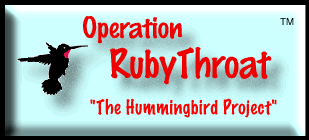 Nonetheless, they are poorly studied in Mexico and Central America where they spend their non-breeding months. During our nine-day field trip in March 2011 to Crooked Tree Wildlife Sanctuary in northcentral Belize, Center director Bill Hilton Jr. will teach participants how hummingbirds are observed, captured, banded, and released. As "citizen scientists," participants will play integral roles in conducting field work and making observation, will visit diverse habitats, and will learn about fascinating aspects of Belize's abundant natural history and fascinating Mayan culture. Nonetheless, they are poorly studied in Mexico and Central America where they spend their non-breeding months. During our nine-day field trip in March 2011 to Crooked Tree Wildlife Sanctuary in northcentral Belize, Center director Bill Hilton Jr. will teach participants how hummingbirds are observed, captured, banded, and released. As "citizen scientists," participants will play integral roles in conducting field work and making observation, will visit diverse habitats, and will learn about fascinating aspects of Belize's abundant natural history and fascinating Mayan culture.
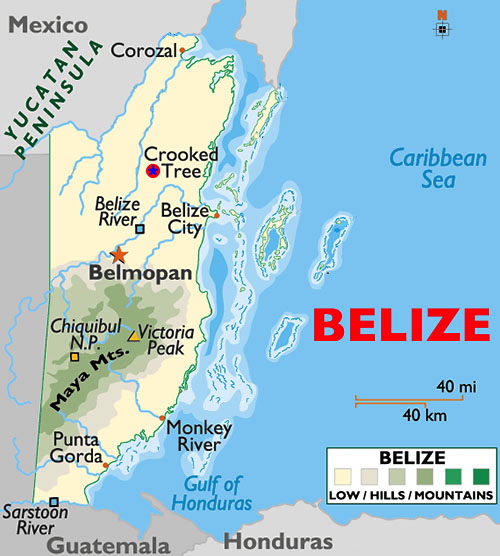
All text, maps & photos © Hilton Pond Center
Belize, a Central American country the size of Massachusetts, is on the western edge of the Caribbean Sea (see map above) and is bordered to the north by Mexico's Yucatan Peninsula and to the west and south by Guatemala. Formerly known as British Honduras, Belize is the only Latin American country in which English is the official language, although Creole and Spanish can also be heard. Guatemalans often claim Belize as part of their own country.
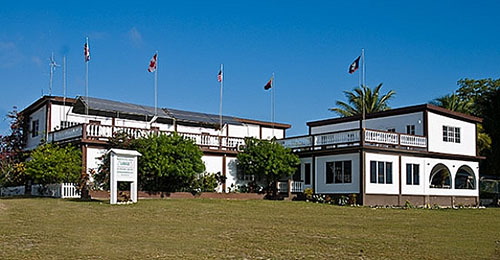
All text, maps & photos © Hilton Pond Center
Our nine-day expedition will be based at Crooked Tree, a 19-square-mile island sanctuary managed by Belize Audubon Society. We'll stay at Bird's Eye View Lodge (above), about 35 miles north of Belize City. This lodge is used by many international tour companies because of its accommodations, excellent food, and proximity to outstanding Belizean nature locales. The air conditioned rooms have hot and cold running water, clean towels daily, private indoor toilets and showers, single and/or double beds, room fans, and screened windows. 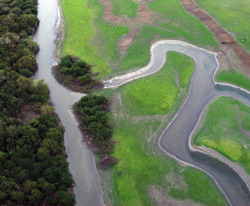 The dining room offers fresh fruit, meats, and vegetables at every meal. There are laundry facilities and wireless Internet is available in the lounge. Our study site(s) are a short walk or ride away. The dining room offers fresh fruit, meats, and vegetables at every meal. There are laundry facilities and wireless Internet is available in the lounge. Our study site(s) are a short walk or ride away.
Crooked Tree Wildlife Sanctuary was established in 1984 to protect resident and migrant birds. The sanctuary includes a network of inland lagoons, swamps, and waterways (above right). During the dry season (i.e., when it's winter in North America), tens of thousands of birds congregate here, taking advantage of abundant food resources in the wetlands. Many Neotropical species find a safe resting spot prior to spring migration back to the U.S. and Canada.
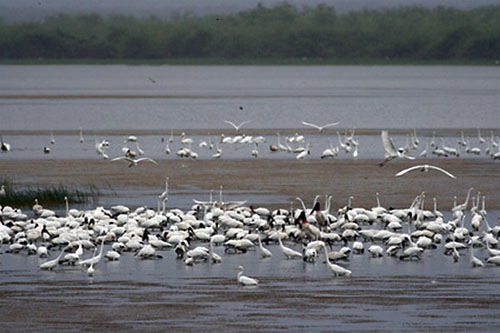
All text, maps & photos © Hilton Pond Center
Multiple habitats in the Crooked Tree area provide food and homes for diverse fauna. Within logwood swamps roost Boat-billed and Chestnut-bellied Herons and Bare-throated Tiger-Herons, while Black-bellied Whistling-Ducks and Muscovy Ducks nest in nearby trees. Snail Kites, feeding almost exclusively on Apple Snails, occur in the lagoon; hundreds of Snowy and Great Egrets fish along the shoreline (above); and five species of kingfishers--along with Ospreys and Black-collared Hawks--dive toward the water for fish. Black Creek with its large trees provides a home for Guatemalan Black Howler Monkeys, Morelet's Crocodiles, Coatimundi, and several species of turtles and iguanas. Two pairs of Jabiru storks (below)--among the largest flying birds in the New World with a wing span of 10-12 feet--are known to nest in the vicinity.
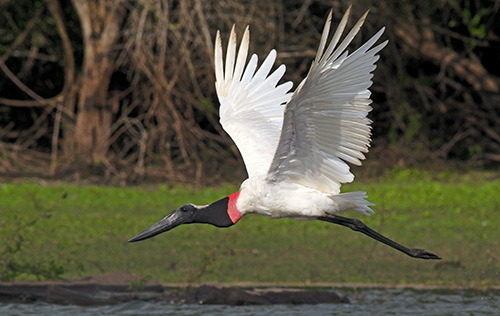
All text, maps & photos © Hilton Pond Center
Within the sanctuary is the village of Crooked Tree (pop. 595), established during the Belizean logwood era. Easy accessibility by boat allowed Crooked Tree to become one of the country's first inland towns. Until 1983 it was still reachable only by boats traveling up Belize River and Black Creek; a 3-1/2 mile causeway now connects the village with the Northern Highway.
Crooked Tree is at low altitude, about 130 feet above sea level. Temperatures are mild to warm, peaking at 90 degrees with mostly sunny days expected during our stay in mid-March--the tropical dry season when humidity is lower than 80%. Occasional days that are overcast are quite comfortable with temperatures in the mid-70s.
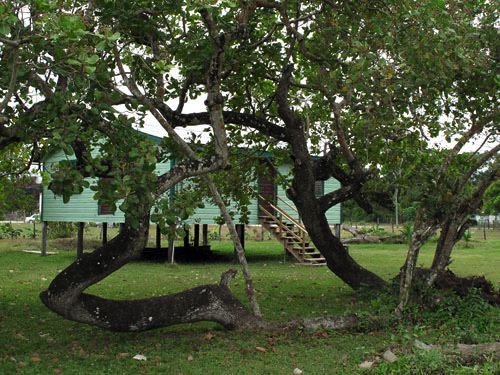
All text, maps & photos © Hilton Pond Center
Birders annually observe numbers of Ruby-throated Hummingbirds feeding on abundant flowering Cashew trees (above) in early to mid-March. These trees grow tall but sometimes fall over in loose soil, meaning we are able to capture hummers in ground-level mist nets. We'll also try to catch ruby-throats in special traps baited with sugar water feeders, especially back at the lodge itself. Traps are selective but mist nets are not, so we'll undoubtedly net and band other North American migrants such as Baltimore Orioles (adult male, below)--plus get chances to photograph exotic, non-migratory tropical species in-the-hand. Belize is host to 26 hummingbird species, some of which we are likely to catch in addition to ruby-throats.
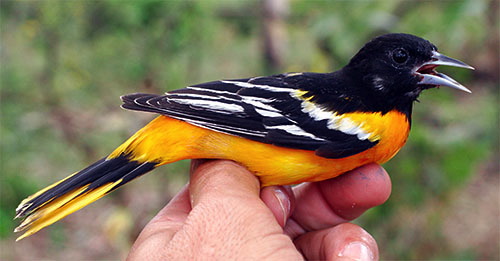
All text, maps & photos © Hilton Pond Center
We will spend mornings observing and trying to catch hummingbirds, usually stopping about noon when we quit for the day. We can't rule out the possibility of some afternoon or evening banding sessions that replace or supplement our morning work. In any case, participants will have sufficient time to eat, rest, and explore Crooked Tree's biological diversity. We won't see or catch as many ruby-throats in Belize as we do in Guanacaste Province, Costa Rica--after all, Aloe Vera fields there may be the densest concentration for the species in all of Central America--but we can guarantee some Ruby-throated Hummingbirds WILL get banded!
The trip is open to ANY adult interested in studying and reporting observations of hummingbirds in Belize (and--after the trip--in the the rest of Central America, Mexico, Canada, and/or the U.S.). You do NOT have to be an experienced birder or scientist or have advanced training; we will teach you everything you need to know to participate in the project.
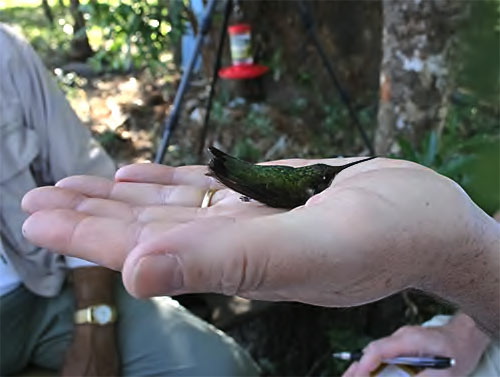
All text, maps & photos © Hilton Pond Center
Because making you a hummingbird bander is NOT the purpose of this particular trip, you will not actually be banding birds or removing them from nets. However, you WILL be involved in every other way: Handling and releasing multiple hummers (above) and other colorful tropical birds, deploying mist nets and traps, collecting and recording data, making valuable field observations, photographing flora and fauna, etc. You will NOT be disappointed!
Our 2011 expedition to the Belizean wintering grounds of Ruby-throated Hummingbirds is scheduled for 3-11 March. We especially encourage participation by K-12 teachers and will be happy to collaborate with them on efforts to find grants to help underwrite trip costs and/or to work with home institutions if they seek graduate credit for the experience. (NOTE: There's also an option for a U.S. or Canadian teacher to travel and participate for FREE by recruiting 14 high school or college students for a special 7-, 8-, or 9-day trip; student trips can be scheduled anytime November through late February. Please contact us for details.)
After reading the itinerary and requirements below, please contact Debbie Sturdivant at Holbrook Travel (1-866-748-6146) if you have any questions about enrolling and/or to request enrollment forms. Register early to guarantee you can participate!
BELIZE ITINERARY HIGHLIGHTS
- Observation, trapping/netting, handling, banding & safe release of Ruby-throated Hummingbirds in the field
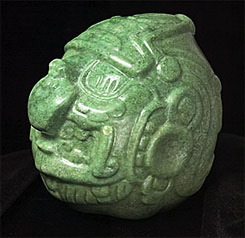 Up-close, in-hand examination of many migrant and resident Neotropical bird species (including other hummingbird species) Up-close, in-hand examination of many migrant and resident Neotropical bird species (including other hummingbird species)
- Half-day field trip to Altun Ha, a Mayan ruin (and the discovery site for a priceless 6" jade head, right, the "Crown Jewel of Belize," now in the Royal Ontario Museum for safekeeping)
- Half-day trip to The Belize Zoo to view native animals in natural habitats
- Sunrise lagoon boat trip for incredible photographic opportunities
- Time to shop, eat & participate in local culture
- Plenty of opportunities for guided and independent exploration, plus observation and photography of fascinating tropical plants and animals
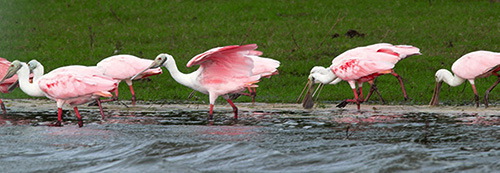
All text, maps & photos © Hilton Pond Center
BELIZE EDUCATIONAL CONNECTIONS
- Hummingbird Observation & Banding
- Neotropical Migrant Bird Behavior
- In-hand Views of Non-migratory Tropical Birds
- Lagoon Ecosystem Ecology (Roseate Spoonbills, above)
- Nocturnal Animal Behavior
- Biodiversity
- Conservation
- Landforms & Watersheds
- Nature Photography
- Pedagogical Field Techniques
- Research Field Techniques
- Belize History & Culture
- Optional graduate credit is available through Weber State University (some trip costs may be deductible as educational expenses and/or be eligible for loans or scholarships from outside sources; teachers should ask principals and district offices if partial funding is available locally)
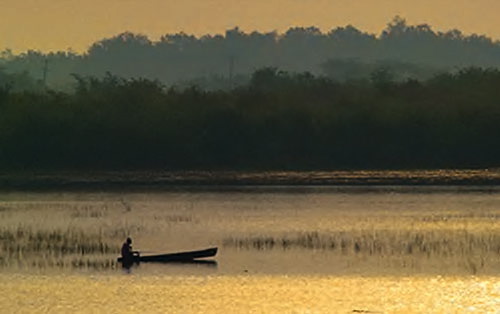
All text, maps & photos © Hilton Pond Center
BELIZE ACTIVE ADVENTURES
(all optional; see Lodge Web page for details)
- Horseback riding
- Swimming
- Canoeing
- Bicycling
- Day hiking
- Nature exploring & photography
- Night hikes
- Etc.
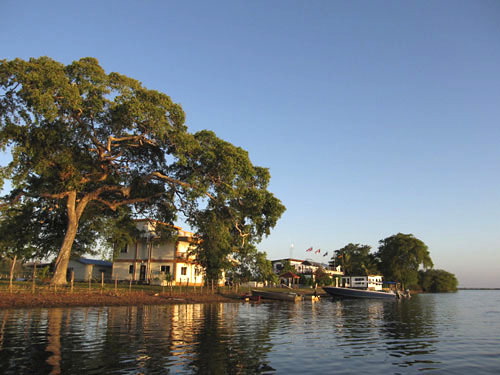
All text, maps & photos © Hilton Pond Center
--DETAILED ITINERARY for BELIZE--
3-11 Mar 2010
(Thursday through Friday of the following week)
DAY 1: March 3 (Thursday)--Arrival, Crooked Tree & Bird's Eye View Lodge
- Early Afternoon: Arrive Belize City airport, greeted by trip leader and local personnel; lunch at airport (optional, depending on arrival time). Transported 30 miles by air-conditioned tour bus to Bird's Eye View Lodge (above), our home base for the week.
- Late Afternoon: Gather at Lodge to watch sunset.
- Supper: At the Lodge (occurs daily, unless otherwise noted)
- Evening: Introductions & Overview of Operation RubyThroat and methodologies to be used while monitoring, capturing & banding Ruby-throated Hummingbirds (Archilochus colubris).
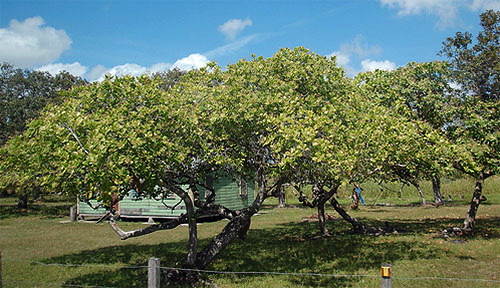
All text, maps & photos © Hilton Pond Center
DAY 2: March 4 (Friday)--Crooked Tree & Day of Discovery
- Early Morning: Breakfast at the Lodge (occurs daily, unless otherwise noted). Walk or ride to study site(s) for Day One of field work; make observations; scout for concentrations of hummingbirds; set traps and/or nets at various sites, including Cashew trees that may be an important local habitats for Ruby-throated Hummingbirds as they move north through Central America in spring migration; record data; band and release hummingbirds as captured. (NOTE: Most days we are at our study site by 6:30 a.m. and depart by noon)
- Lunch: Back at the Lodge (occurs daily, unless otherwise noted).
- Afternoon: Explore Crooked Tree's bountiful habitats on your own; great chances for observations and photos of local flora and fauna.
- Late Afternoon: Gather at Lodge to watch sunset.
- Evening: Continuation of Operation RubyThroat discussions. Introduction to Belizean culture. Informal presentations by trip participants. (On at least one evening we will have opportunity for an optional night hike to observe nocturnal inhabitants of Crooked Tree Sanctuary.)

All text, maps & photos © Hilton Pond Center
DAY 3: March 5 (Saturday)--Crooked Tree & Altun Ha
- Early Morning: Day Two of hummingbird observations and banding at study site(s).
- Afternoon: Field trip to Altun Ha (above), an ancient five-square-mile Mayan settlement containing 500 structures; its largest pyramid, the "Temple of the Masonry Altars" (below), is 54 feet high. The city was occoupied from about 200 BC through 1000 AD. A great day to go back in history to one of the most important civilizations in the Western Hemisphere.
- Late Afternoon: Gather at Lodge to watch sunset.
- Evening: Continuation of Operation RubyThroat discussions. Informal presentations.
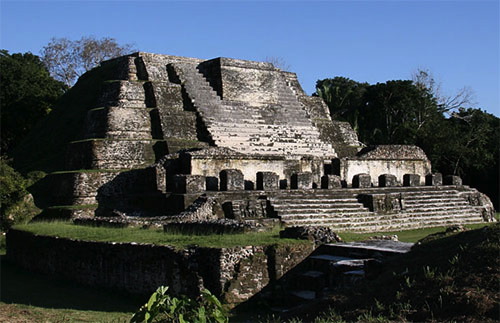
All text, maps & photos © Hilton Pond Center
DAY 4: March 6 (Sunday)--Crooked Tree
- Early Morning: Day Three of hummingbird observations and banding at study site(s).
- Afternoon: Explore Crooked Tree's habitats on your own.
- Late Afternoon: Gather at Lodge to watch sunset.
- Evening: Continuation of Operation RubyThroat discussions. Informal presentations.

All text, maps & photos © Hilton Pond Center
DAY 5: March 7 (Monday)--"Hump Day" at Crooked Tree
- Early Morning: Sunrise Birding-by-Boat cruise into the lagoon (above)
- Late Morning & Afternoon: Explore Crooked Tree habitats on your own. Stalk wildlife for unforgettable photos. Optional activities such as horseback ride, canoe or bicycle trips, etc.
- Late Afternoon: Gather at Lodge to watch sunset.
- Evening: Continuation of Operation RubyThroat discussions. Informal presentations. Optional Night Hike.
DAY 6: March 8 (Tuesday)--Crooked Tree
- Early Morning: Day Four of hummingbird observations and banding at study site(s).
- Afternoon: Explore Crooked Tree habitats on your own.
- Late Afternoon: Gather at Lodge to watch sunset.
- Evening: Continuation of Operation RubyThroat discussions. Informal presentations.
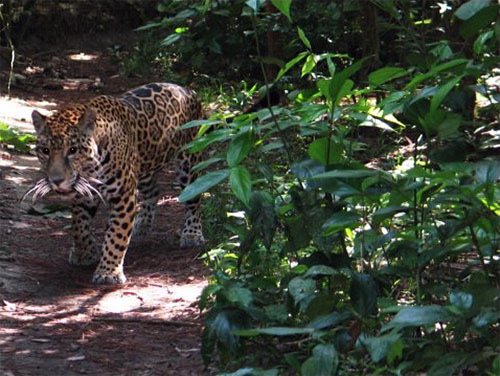
All text, maps & photos © Hilton Pond Center
DAY 7: March 9 (Wednesday)--Crooked Tree & Belize Zoo
- Early Morning: Day Five of hummingbird observations and banding at study site(s).
- Afternoon:
 Trip to The Belize Zoo, known as "The Best Little Zoo in the World." This 29-acre tropical savannah site exhibits more than 130 species of birds and animals--ALL native to Belize. This is an opportunity for up-close views of otherwise inaccessible creatures such as Jaguars (above) and Black Howler Monkeys (below), Harpy Eagles & King Vultures. Trip to The Belize Zoo, known as "The Best Little Zoo in the World." This 29-acre tropical savannah site exhibits more than 130 species of birds and animals--ALL native to Belize. This is an opportunity for up-close views of otherwise inaccessible creatures such as Jaguars (above) and Black Howler Monkeys (below), Harpy Eagles & King Vultures.
- Late Afternoon: Gather at Lodge to watch sunset.
- Evening: Continuation of Operation RubyThroat discussions. Informal presentations and introduction to Costa Rican culture.
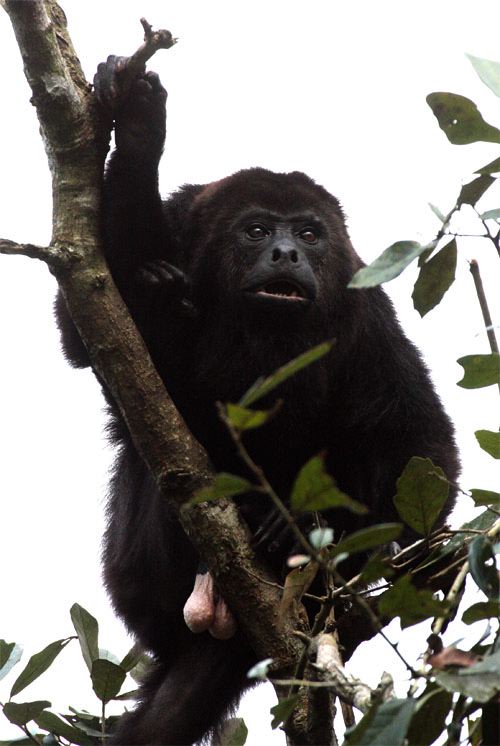
All text, maps & photos © Hilton Pond Center
DAY 8: March 10 (Thursday)--Crooked Tree
- Early Morning: Day Six of hummingbird observations and banding at study site(s).
- Afternoon: Explore Crooked Tree habitats on your own. Begin packing for next day's departure.
- Late Afternoon: Gather at Lodge to watch sunset.
- Evening: Final analysis of hummingbird data & "Farewell Fiesta."
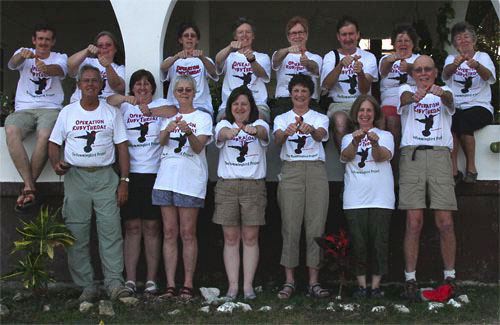
All text, maps & photos © Hilton Pond Center
DAY 9: March 11 (Friday)--Bird's Eye View Lodge & Departure
- Morning: Depart for Belize City airport and flights home (hugs optional but likely among new friends).
- Evening: Dream in your own hometown bed about hummingbirds and warm, sunny Belize!
The main purpose of any Operation RubyThroat expedition to the Neotropics is to learn about Ruby-throated Hummingbird "winter" behavior; thus, your active participation in making daily observations and collecting data is critical to the trip's success. A working pair of good binoculars is the only required equipment. We expect you to take initiative, carry your share of the load, and listen to and follow instructions carefully. We also expect you to look out for each other's needs and to be considerate of the hummingbirds we work with. We will have many wonderful and enjoyable experiences together, but this is NOT a pleasure trip--even though you'll have plenty of free time and are certain to have fun.
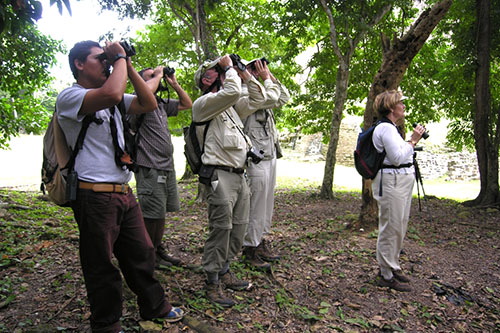
All text, maps & photos © Hilton Pond Center
If you are NOT willing to work hard in the field all week and follow the expedition's research and education goals, this is not a trip for you; we NEED your help and our success will depend on you. Days typically involve early through late-morning field activity under warm to hot conditions and after-supper meetings, with most afternoons open for you to do as you wish. Scheduled activities are subject to change due to weather or to take advantage of unexpected learning and research opportunities, but we'll do everything we can to make sure we offer all non-research activities described above.
BELIZE EXPEDITION LEADERS
BILL HILTON JR. (below left), internationally known educator-naturalist, was twice named South Carolina Science Teacher of the Year and was honored as the state's Outstanding Biology Teacher. In 1998, The Charlotte Observer named him a Carolinas "Guardian of the Environment" for a lifetime of trend-setting work in conservation and environmental education. 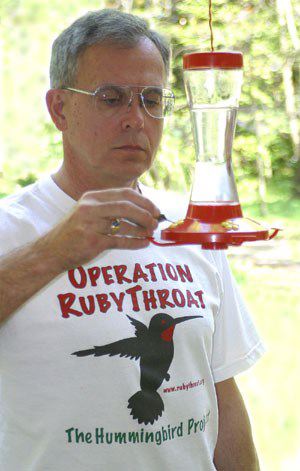 He has led ten highly successful hummingbird expeditions to Costa Rica and one to Belize. The December 2008 issue of Discover magazine cited Hilton as one of the top ten amateur scientists in America and one of the nation's "50 Best Brains in Science." He has led ten highly successful hummingbird expeditions to Costa Rica and one to Belize. The December 2008 issue of Discover magazine cited Hilton as one of the top ten amateur scientists in America and one of the nation's "50 Best Brains in Science."
Hilton is executive director of Hilton Pond Center for Piedmont Natural History. As principal investigator for "Operation RubyThroat: The Hummingbird Project," he received a 42-month grant from the National Science Foundation to integrate Operation RubyThroat with The GLOBE Program. Since 1982, Hilton has banded more than 54,000 birds at Hilton Pond, including 4,000-plus Ruby-throated Hummingbirds.
Hilton taught in Rock Hill and Fort Mill SC high schools, and at the University of Minnesota, St. Olaf College, and Winthrop University. He helped start the residential South Carolina Governor’s School for Science and Mathematics in Hartsville, which he served as biology instructor and director of student research.
Hilton is a nationally sought-after speaker on diverse natural history topics. He has a Bachelor of Arts in Philosophy from Newberry College, which he served as president of the Alumni Association. In this role, he organized a major international symposium on John Bachman, founder of Newberry College and a contemporary of John James Audubon. Hilton earned a Master of Arts in Biology Teaching from Winthrop University, and a Master of Science in Ecology & Behavioral Biology from the University of Minnesota, where he conducted a four-year field study of the behavioral ecology of Blue Jays, Cyanocitta cristata. For a complete resume, see his Biographical Sketch.
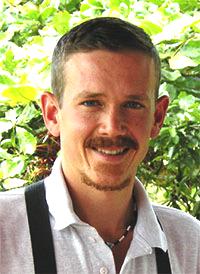 Hilton and the group will be assisted by ERNESTO M. CARMAN JR. of Talamanca Hawkwatch and Programa Conservacion de Aves. Ernesto (at right), a native-born Costa Rican (tico), speaks fluent English and Spanish, and is one of only a few naturalists with extensive experience observing Ruby-throated Hummingbirds within Costa Rica and Belize. Ernesto's sharp eyes and ears, comprehensive knowledge, and terrific personality greatly enrich our time in the field in Belize. After six years of involvement with our Neotropical hummingbird project he is a true collaborator and not just a guide. Ernesto's family runs Finca Cristina, an environmentally friendly coffee farm in Paraiso, Costa Rica that uses shade-grown organic techniques and recycles processing materials. Hilton and the group will be assisted by ERNESTO M. CARMAN JR. of Talamanca Hawkwatch and Programa Conservacion de Aves. Ernesto (at right), a native-born Costa Rican (tico), speaks fluent English and Spanish, and is one of only a few naturalists with extensive experience observing Ruby-throated Hummingbirds within Costa Rica and Belize. Ernesto's sharp eyes and ears, comprehensive knowledge, and terrific personality greatly enrich our time in the field in Belize. After six years of involvement with our Neotropical hummingbird project he is a true collaborator and not just a guide. Ernesto's family runs Finca Cristina, an environmentally friendly coffee farm in Paraiso, Costa Rica that uses shade-grown organic techniques and recycles processing materials.

2010 BELIZE LAND PROGRAM COST: $1,995
(Please e-mail Wendy Frazier, Holbrook Travel's air specialist, for international airfare rates from your city. Holbrook often has access to "add-on" airfare at rates cheaper than those available to the general public. Holbrook can also arrange trip extensions before or after the Operation RubyThroat expedition.)
NOTE: Alumni of any Holbrook Professional Development Expedition--including past Operation RubyThroat trips to Costa Rica & Belize--are eligible for a $150 discount for any and all of the 2011 Operation RubyThroat excursions.
--Rates are based on: Double occupancy with a full roster of 12 participants and subject to increase with fewer participants. (Although any participant may select a single room for an additional $325, we recommend doubling as part of the community experience.) Belize is more expensive than other Central American countries, but the overall experience offered by our trip is well worth it.
--Participants must be: At least 21 years of age by the time the trip begins, and willing and able to participate in field work and all education and research activities. (Special consideration may be given on a case-by-case basis for college students and for advanced, mature senior high school students accompanied by a parent. We also can offer a full week in Central America for a class of 12-14 responsible high school or college students almost any time between November and late February; the sponsoring teacher earns a FREE trip. Please contact us for details.)
--Each participant must: Bring and know how to use a decent pair of binoculars with which to make field observations. Sharing binoculars doesn't work.
--Participants must be: In good physical & mental health and able to walk at slow to moderate pace for short distances (usually less than a half mile) over mostly level terrain at the study site, 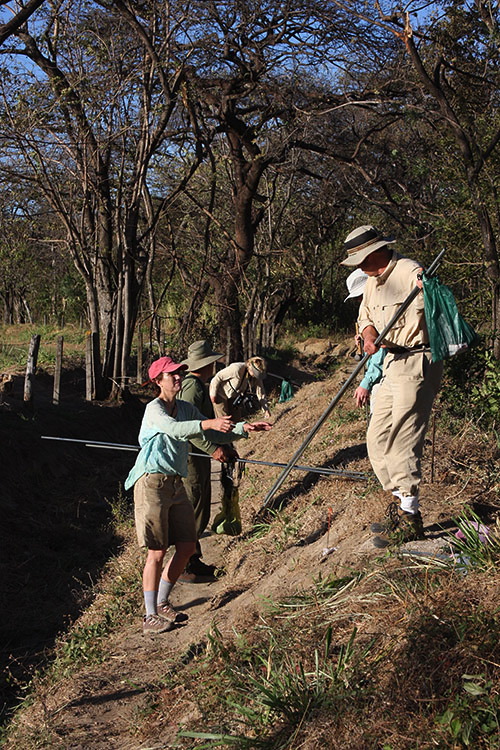 and be able to carry light objects in the field (mist net poles, banding tools, day pack, etc.). Participants may need to stand for extended periods (up to 60 minutes) to monitor nets under sunny conditions, with opportunities for water breaks in the shade. On past expeditions, participants as old as 80 have had no problems with the minimal physical demands of the project. and be able to carry light objects in the field (mist net poles, banding tools, day pack, etc.). Participants may need to stand for extended periods (up to 60 minutes) to monitor nets under sunny conditions, with opportunities for water breaks in the shade. On past expeditions, participants as old as 80 have had no problems with the minimal physical demands of the project.
--Program cost includes: All in-country transportation; accommodations; meals; expert local guide during excursions; learning activities and field trips; and Operation RubyThroat instructional materials, as stated above.
--Program cost does not include: International airfare (about $500-$750, depending on departure point; use frequent flyer miles if you can); meals, if any, away from the hotel; any additional optional activities not described above; non-mealtime beverages or snacks; estimated $30 departure tax; gratuities for guide, driver, and local personnel; or optional graduate credit costs. (Please note that because of difficulty with international connections and depending on your point of origin, it may be necessary for you to spend an extra night traveling to and/or from Belize.)
--Payment policy: To confirm your space, send a $200 deposit per person to Holbrook Travel along with your enrollment form(s); deposit is due on or before 4 October 2010. We suggest early deposit to guarantee your space. Each deposit is refundable minus a $100 processing fee if cancellation is received by 27 November 2010; there will be no refunds for cancellations after that date. Final payment of $1,995 is due on 28 November 2010. (We STRONGLY advise inexpensive third-party trip insurance to cover unexpected circumstances that could cause you to cancel after your final payment is made; such insurance can also cover flight delays and related land transportation, in-country medical care, etc.)
--Pre-trip activities: We will communicate with you frequently via e-mail in the weeks leading up to your trip. You'll also receive suggested readings and resources that will enhance your trip experience. We anticipate you will study and learn all important information related to the trip's research goals.
--Optional graduate credit: Contact Holbrook Travel's Debbie Sturdivant for information about how to apply and pay for graduate credit through Weber State University. You may also elect to work with your local college to earn credit there. K-12 educators may file for continuing education credits.
--Tax deductions: Because Operation RubyThroat expeditions are service projects in support of the non-profit Hilton Pond Center, an estimated $400 of your fees should be tax-deductible on your 2010 tax forms.  If you are participating as part of a college degree program or are a classroom teacher, additional tax deductions may be taken--in fact, the FULL COST of the trip may be deductible. (In some cases, this means after taxes the trip actually will end up costing you nothing!) If you are participating as part of a college degree program or are a classroom teacher, additional tax deductions may be taken--in fact, the FULL COST of the trip may be deductible. (In some cases, this means after taxes the trip actually will end up costing you nothing!)
Hilton Pond Center for Piedmont Natural History and Operation RubyThroat: The Hummingbird Project expeditions are non-profit trips offered as outreach activities through which we learn more about winter behavior of Ruby-throated Hummingbirds. If you're interested in making a separate contribution to the Center and/or Operation RubyThroat, please see Supporting the Work of Hilton Pond Center.
After reading the information above, contact Debbie Sturdivant at Holbrook Travel by E-mail or phone (1-866-748-6146) if you have any questions about enrolling and/or to request enrollment forms. You can also ENROLL ON-LINE. See you in Belize!
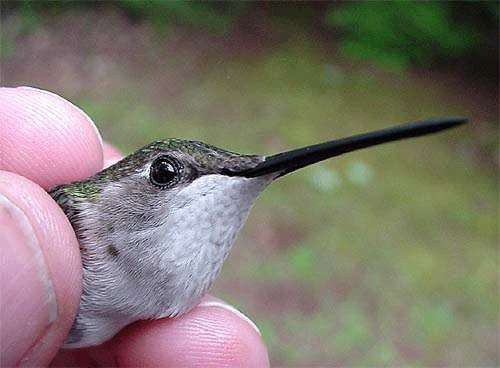
Adult female Ruby-throated Hummingbird (above),
captured for banding
All text, maps & photos © Hilton Pond Center
For complete reports on all our successful Neotropical hummingbird banding expeditions, please visit
"This Week at Hilton Pond" at the following links:
|
|
|
|
|
|
|
|
|
|
|
|
|
|
|
|



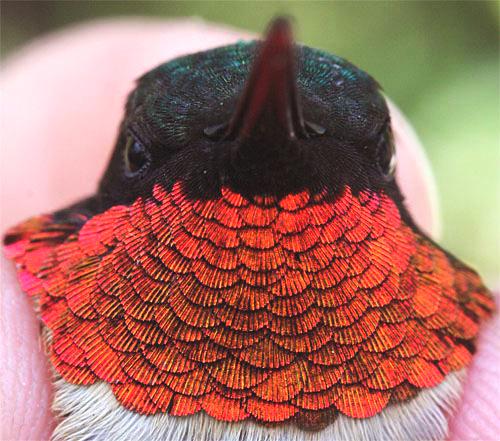
 Nonetheless, they are poorly studied in Mexico and Central America where they spend their non-breeding months. During our nine-day field trip in March 2011 to Crooked Tree Wildlife Sanctuary in northcentral Belize, Center director Bill Hilton Jr. will teach participants how hummingbirds are observed, captured, banded, and released. As "citizen scientists," participants will play integral roles in conducting field work and making observation, will visit diverse habitats, and will learn about fascinating aspects of Belize's abundant natural history and fascinating Mayan culture.
Nonetheless, they are poorly studied in Mexico and Central America where they spend their non-breeding months. During our nine-day field trip in March 2011 to Crooked Tree Wildlife Sanctuary in northcentral Belize, Center director Bill Hilton Jr. will teach participants how hummingbirds are observed, captured, banded, and released. As "citizen scientists," participants will play integral roles in conducting field work and making observation, will visit diverse habitats, and will learn about fascinating aspects of Belize's abundant natural history and fascinating Mayan culture.

 The dining room offers fresh fruit, meats, and vegetables at every meal. There are laundry facilities and wireless Internet is available in the lounge. Our study site(s) are a short walk or ride away.
The dining room offers fresh fruit, meats, and vegetables at every meal. There are laundry facilities and wireless Internet is available in the lounge. Our study site(s) are a short walk or ride away.




 Up-close, in-hand examination of many migrant and resident Neotropical bird species (including other hummingbird species)
Up-close, in-hand examination of many migrant and resident Neotropical bird species (including other hummingbird species)








 Trip to The Belize Zoo, known as "The Best Little Zoo in the World." This 29-acre tropical savannah site exhibits more than 130 species of birds and animals--ALL native to Belize. This is an opportunity for up-close views of otherwise inaccessible creatures such as Jaguars (above) and Black Howler Monkeys (below), Harpy Eagles & King Vultures.
Trip to The Belize Zoo, known as "The Best Little Zoo in the World." This 29-acre tropical savannah site exhibits more than 130 species of birds and animals--ALL native to Belize. This is an opportunity for up-close views of otherwise inaccessible creatures such as Jaguars (above) and Black Howler Monkeys (below), Harpy Eagles & King Vultures.



 He has led ten highly successful hummingbird expeditions to Costa Rica and one to Belize. The December 2008 issue of Discover magazine cited Hilton as one of the top ten amateur scientists in America and one of the nation's "50 Best Brains in Science."
He has led ten highly successful hummingbird expeditions to Costa Rica and one to Belize. The December 2008 issue of Discover magazine cited Hilton as one of the top ten amateur scientists in America and one of the nation's "50 Best Brains in Science." Hilton and the group will be assisted by ERNESTO M. CARMAN JR. of Talamanca Hawkwatch and Programa Conservacion de Aves. Ernesto (at right), a native-born Costa Rican (tico), speaks fluent English and Spanish, and is one of only a few naturalists with extensive experience observing Ruby-throated Hummingbirds within Costa Rica and Belize. Ernesto's sharp eyes and ears, comprehensive knowledge, and terrific personality greatly enrich our time in the field in Belize. After six years of involvement with our Neotropical hummingbird project he is a true collaborator and not just a guide. Ernesto's family runs
Hilton and the group will be assisted by ERNESTO M. CARMAN JR. of Talamanca Hawkwatch and Programa Conservacion de Aves. Ernesto (at right), a native-born Costa Rican (tico), speaks fluent English and Spanish, and is one of only a few naturalists with extensive experience observing Ruby-throated Hummingbirds within Costa Rica and Belize. Ernesto's sharp eyes and ears, comprehensive knowledge, and terrific personality greatly enrich our time in the field in Belize. After six years of involvement with our Neotropical hummingbird project he is a true collaborator and not just a guide. Ernesto's family runs  and be able to carry light objects in the field (mist net poles, banding tools, day pack, etc.). Participants may need to stand for extended periods (up to 60 minutes) to monitor nets under sunny conditions, with opportunities for water breaks in the shade. On past expeditions, participants as old as 80 have had no problems with the minimal physical demands of the project.
and be able to carry light objects in the field (mist net poles, banding tools, day pack, etc.). Participants may need to stand for extended periods (up to 60 minutes) to monitor nets under sunny conditions, with opportunities for water breaks in the shade. On past expeditions, participants as old as 80 have had no problems with the minimal physical demands of the project. If you are participating as part of a college degree program or are a classroom teacher, additional tax deductions may be taken--in fact, the FULL COST of the trip may be deductible. (In some cases, this means after taxes the trip actually will end up costing you nothing!)
If you are participating as part of a college degree program or are a classroom teacher, additional tax deductions may be taken--in fact, the FULL COST of the trip may be deductible. (In some cases, this means after taxes the trip actually will end up costing you nothing!)


 You can also
You can also